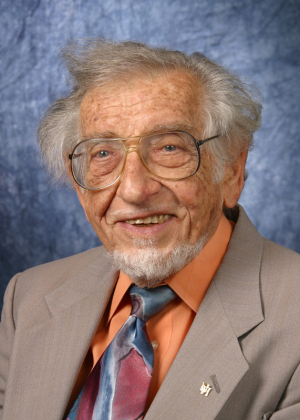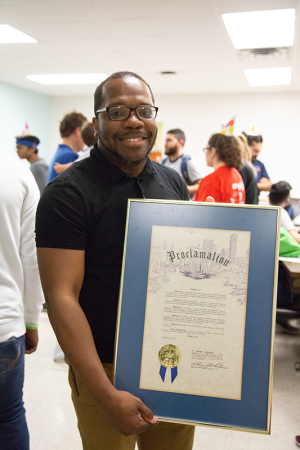Gerhard “Gerry” F. Paskusz, professor emeritus of electrical engineering at the University of Houston Cullen College of Engineering and founder of its award-winning Program for Mastery in Engineering Studies (PROMES), died Nov. 23, 2019, in California. He was 97.
“Dr. Paskusz transformed engineering education at the UH Cullen College and helped shape continuing generations of successful engineers,” said Joseph W. Tedesco, Elizabeth D. Rockwell Dean of the Cullen College. “We were blessed to have him as part of our community. Our hearts go out to his family and loved ones at this very difficult time.”
The author of several books and articles on electrical engineering education, minority education programs and teaching innovations, Paskusz was born Jan. 21, 1922, in Austria. He earned his bachelor’s degree in engineering in 1949 and his Ph.D. in engineering in 1961 from the University of California, Los Angeles.
After teaching at UCLA while getting his doctorate, he joined the University of Houston faculty in 1961 as an associate professor. He was promoted to professor in 1968 and served as associate dean for undergraduate studies from 1968 to 1976.
A Legacy of a Lifetime
Before turning his focus to undergraduate studies, Paskusz played a key role in building and launching the graduate programs in the Department of Electrical Engineering, which was later renamed the Department of Electrical and Computer Engineering (ECE).
He built the University’s first ruby laser, a solid-state laser using a synthetic ruby crystal as its laser medium.
In addition, Paskusz helped pioneer a team-based approach in teaching that places the student in the roll of the teacher, a method that has been shown to boost grades and graduation rates for students.
"It's almost axiomatic that students can communicate with their peers better than the instructor can," Paskusz said in a 2003 interview.
The state-funded "Redshirt Camp" program currently used by ECE to help boost passing rates for difficult sophomore-level courses is based on Paskusz’s methods.
The Birth of PROMES
He established PROMES – pronounced “promise” – in 1974 for the recruitment, retention and academic development of Hispanic, African American and Native American engineering students.
Paskusz credited a speech by Reginald H. Jones, who led General Electric from 1972 to 1981 and advised three U.S. presidents on economic policy, for the impetus. In that speech, Jones said that if America wanted to improve the economic future for minority students, getting them into engineering was key.
PROMES, which was originally known as the Program for Minority Engineering Students, started with eight students and a $5,000 grant from Dupont.
“We got to know them [the students], they got to know us, they got to know each other,” said Paskusz in a 2002 interview. “We wanted to make sure the students were working together, helping each other and competing with each other. That, from the very beginning, has been our aim.”
Paskusz, who served as the first director, retired from the program in August 2005 after 31 years.
Today PROMES is open to all students in the college, and its mission is to provide a positive learning environment that supports the needs of undergraduate engineering students. It supports student success through academic advising, workshops, scholarships, community and other professional and personal development opportunities.
About 5,000 students have come through PROMES since fall 1998, and there are currently 415 PROMES scholars enrolled.
The program won two consecutive awards from INSIGHT Into Diversity, the largest and oldest U.S.-based diversity and inclusion magazine and website in higher education. It received a 2018 Inspiring Programs in STEM Award and Jerrod Henderson, the current director of PROMES, was honored with a 2017 Inspiring Leader in STEM Award. The UH System Board of Regents also recognized PROMES with the Regents' Academic Excellence Award in 2018.
Paskusz garnered several accolades for his work. He was elected as a fellow of the American Society for Engineering Education (ASEE) in 2003 and received the Dupont Minorities in Engineering Award from the organization in 2007.
“The PROMES community – staff, advisory board, and PROMES Scholars, those who met Dr. Paskusz and those who have not – mourns the loss of such a giant in higher education,” said Henderson. “As we chart the course for diversity, inclusion, recruitment and retention, Dr. Paskusz’s legacy of being a trailblazer lives on in PROMES. We are inspired by his life and seek to continue to build upon the foundation that he established.”

